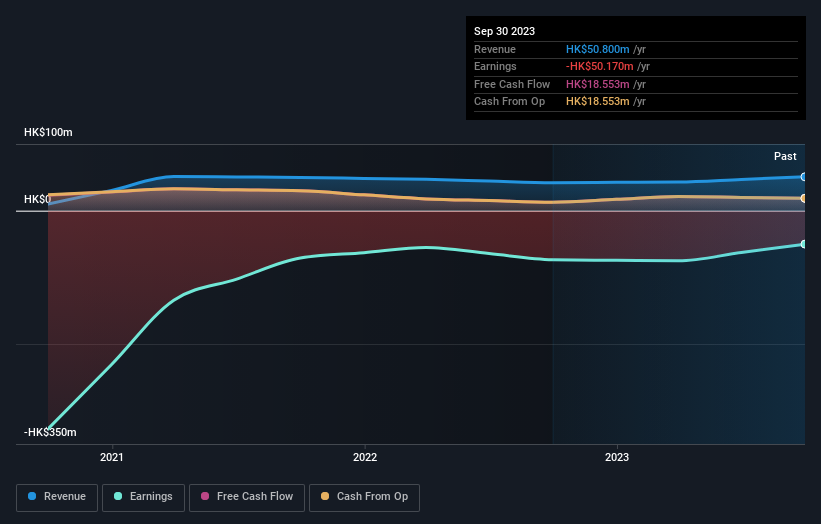Stock Analysis
- Hong Kong
- /
- Real Estate
- /
- SEHK:277
Shareholders in Tern Properties (HKG:277) have lost 52%, as stock drops 16% this past week

We think intelligent long term investing is the way to go. But no-one is immune from buying too high. Zooming in on an example, the Tern Properties Company Limited (HKG:277) share price dropped 54% in the last half decade. We certainly feel for shareholders who bought near the top. And some of the more recent buyers are probably worried, too, with the stock falling 48% in the last year. Shareholders have had an even rougher run lately, with the share price down 29% in the last 90 days.
Given the past week has been tough on shareholders, let's investigate the fundamentals and see what we can learn.
See our latest analysis for Tern Properties
Tern Properties isn't currently profitable, so most analysts would look to revenue growth to get an idea of how fast the underlying business is growing. Shareholders of unprofitable companies usually expect strong revenue growth. That's because fast revenue growth can be easily extrapolated to forecast profits, often of considerable size.
Over half a decade Tern Properties reduced its trailing twelve month revenue by 12% for each year. That's definitely a weaker result than most pre-profit companies report. Arguably, the market has responded appropriately to this business performance by sending the share price down 9% (annualized) in the same time period. It's fair to say most investors don't like to invest in loss making companies with falling revenue. You'd want to research this company pretty thoroughly before buying, it looks a bit too risky for us.
You can see how earnings and revenue have changed over time in the image below (click on the chart to see the exact values).

Take a more thorough look at Tern Properties' financial health with this free report on its balance sheet.
A Different Perspective
While the broader market lost about 8.2% in the twelve months, Tern Properties shareholders did even worse, losing 48% (even including dividends). However, it could simply be that the share price has been impacted by broader market jitters. It might be worth keeping an eye on the fundamentals, in case there's a good opportunity. Unfortunately, last year's performance may indicate unresolved challenges, given that it was worse than the annualised loss of 9% over the last half decade. We realise that Baron Rothschild has said investors should "buy when there is blood on the streets", but we caution that investors should first be sure they are buying a high quality business. It's always interesting to track share price performance over the longer term. But to understand Tern Properties better, we need to consider many other factors. Case in point: We've spotted 1 warning sign for Tern Properties you should be aware of.
If you like to buy stocks alongside management, then you might just love this free list of companies. (Hint: insiders have been buying them).
Please note, the market returns quoted in this article reflect the market weighted average returns of stocks that currently trade on Hong Kong exchanges.
Valuation is complex, but we're helping make it simple.
Find out whether Tern Properties is potentially over or undervalued by checking out our comprehensive analysis, which includes fair value estimates, risks and warnings, dividends, insider transactions and financial health.
View the Free AnalysisHave feedback on this article? Concerned about the content? Get in touch with us directly. Alternatively, email editorial-team (at) simplywallst.com.
This article by Simply Wall St is general in nature. We provide commentary based on historical data and analyst forecasts only using an unbiased methodology and our articles are not intended to be financial advice. It does not constitute a recommendation to buy or sell any stock, and does not take account of your objectives, or your financial situation. We aim to bring you long-term focused analysis driven by fundamental data. Note that our analysis may not factor in the latest price-sensitive company announcements or qualitative material. Simply Wall St has no position in any stocks mentioned.
About SEHK:277
Tern Properties
Tern Properties Company Limited, an investment holding company, engages in property investment and leasing, and treasury investment businesses in Hong Kong.
Flawless balance sheet with weak fundamentals.

